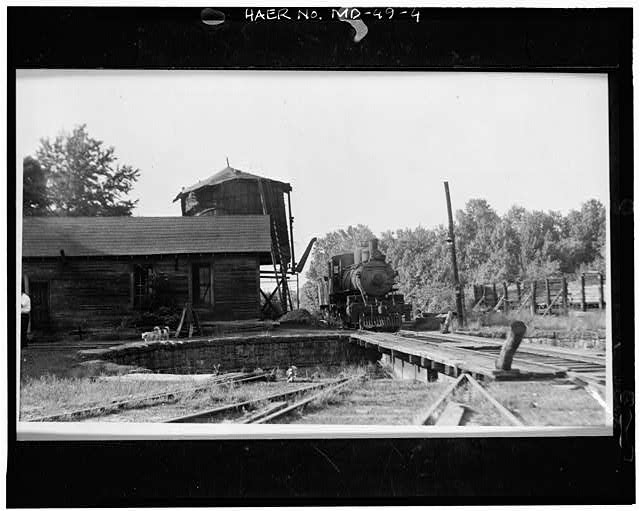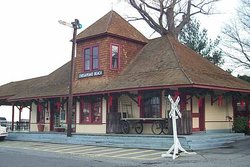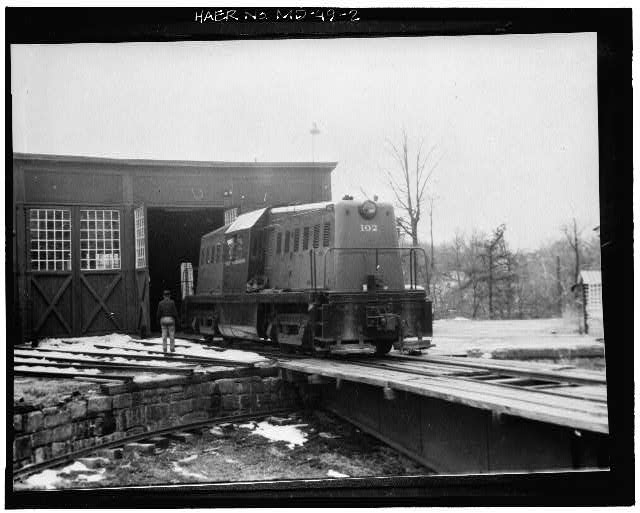Difference between revisions of "Chesapeake Beach Railway Museum"
(→Historic Photos) |
|||
| Line 1: | Line 1: | ||
| − | [[Image:Chesapeake_Beach_Railway_Museum.jpg|right|250px]]Build a lavish resort town on the shores of the [[Chesapeake Bay]], with reliable and | + | [[Image:Chesapeake_Beach_Railway_Museum.jpg|right|250px]]Build a lavish resort town on the shores of the [[Chesapeake Bay]], with reliable and convenient railroad service from Washington and Baltimore. That was the vision of Otto Mears, an independent short line railroad builder from Colorado. |
| − | In the late 1890's, Mears and a group of Denver associates designed [[Chesapeake Beach]] as a resort town complete with beachfront hotels, a race track, casino, bathhouses and beaches. A 1600-foot boardwalk was built over the water, supporting various attractions: a band shell, a carousel, a dance pavilion, a roller coaster and many entertainment booths. A mile-long pier was built to receive passengers arriving daily by streamer from Baltimore in the summer months. | + | In the late 1890's, Mears and a group of Denver associates designed [[Chesapeake Beach, Maryland]] as a resort town complete with beachfront hotels, a race track, casino, bathhouses and beaches. A 1600-foot boardwalk was built over the water, supporting various attractions: a band shell, a carousel, a dance pavilion, a roller coaster and many entertainment booths. A mile-long pier was built to receive passengers arriving daily by streamer from Baltimore in the summer months. |
| − | Construction of the railway began at the same time, and on June 9, 1900, the first train arrived at | + | Construction of the railway began at the same time, and on June 9, 1900, the first train arrived at Chesapeake Beach with much fanfare a full load of passengers. The one-hour excursion, nicknamed the "Honeysuckle Route," carried passengers and freight daily through the Southern Maryland countryside. Like the trip itself, however, the train to Chesapeake Beach wasn't destined to last very long. Financial hardship caused by the Great Depression of the 1930's and the increasing popularity of the automobile brought on the demise of the railroad. On April 15, 1935, the final train chugged away from the Chesapeake Beach station with its last passengers. |
Today, thanks to the work of local preservationists and the [[Calvert County Historical Society]], the old railroad station can take you further than ever, because now it guides you on a journey through time. | Today, thanks to the work of local preservationists and the [[Calvert County Historical Society]], the old railroad station can take you further than ever, because now it guides you on a journey through time. | ||
Revision as of 02:43, 28 November 2008
Build a lavish resort town on the shores of the Chesapeake Bay, with reliable and convenient railroad service from Washington and Baltimore. That was the vision of Otto Mears, an independent short line railroad builder from Colorado.
In the late 1890's, Mears and a group of Denver associates designed Chesapeake Beach, Maryland as a resort town complete with beachfront hotels, a race track, casino, bathhouses and beaches. A 1600-foot boardwalk was built over the water, supporting various attractions: a band shell, a carousel, a dance pavilion, a roller coaster and many entertainment booths. A mile-long pier was built to receive passengers arriving daily by streamer from Baltimore in the summer months.
Construction of the railway began at the same time, and on June 9, 1900, the first train arrived at Chesapeake Beach with much fanfare a full load of passengers. The one-hour excursion, nicknamed the "Honeysuckle Route," carried passengers and freight daily through the Southern Maryland countryside. Like the trip itself, however, the train to Chesapeake Beach wasn't destined to last very long. Financial hardship caused by the Great Depression of the 1930's and the increasing popularity of the automobile brought on the demise of the railroad. On April 15, 1935, the final train chugged away from the Chesapeake Beach station with its last passengers.
Today, thanks to the work of local preservationists and the Calvert County Historical Society, the old railroad station can take you further than ever, because now it guides you on a journey through time.
The Chesapeake Beach Railway station, fashioned into a museum in 1979, recreates memories of the bayside resort of nearly a century ago. The museum offers visitors an audio-visual presentation featuring the history of the Chesapeake Beach Railway, as well as artifacts, photographs and exhibits portraying resort life and transportation in the early 1900's.
The trains may never run again, but the museum can still take you back to turn-of-the-century Chesapeake Beach. Relive the magical era. Come to the Chesapeake Beach Railway Museum.
4155 Mears Avenue P.O. Box 783 Chesapeake Beach, MD 20732 410-257-3892 1-800-331-9771 TTY: 1-800-735-2258
Historic Photos
 Chesapeake Beach Railroad Engine House, 21 Yost Place, Seat Pleasant, Prince George's County, Md. VIEW NORTH, YARD NORTH OF ENGINE HOUSE, SHOWING WATER TANK AND SHOP Photocopy of photograph, 1941 (Courtesy of Chesapeake Beach Railway Museum; L. W. Rice, photographer). LoC.
Chesapeake Beach Railroad Engine House, 21 Yost Place, Seat Pleasant, Prince George's County, Md. VIEW NORTH, YARD NORTH OF ENGINE HOUSE, SHOWING WATER TANK AND SHOP Photocopy of photograph, 1941 (Courtesy of Chesapeake Beach Railway Museum; L. W. Rice, photographer). LoC.
Chesapeake Beach Railroad Engine House, 21 Yost Place, Seat Pleasant, Prince George's County, Md. VIEW SOUTH, NORTH ELEVATION SHOWING BAYS 2 and 3, DIESEL AND TURNTABLE Photocopy of photograph, 1976 (Courtesy of Chesapeake Beach Railway Museum; Roy Hartman, photographer). LoC.

